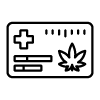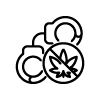Cannabis Laws in United States

Fully Legalized for Adult Use?

Fully Legalized for Medical Use?

CBD only?

Decriminalized?
Disclaimer: This information is provided for general informational purposes only and may not reflect the most current legal requirements in United States. Cannabislaws.global recommends you consult with a qualified local attorney or legal expert for accurate and up-to-date information. This information is not intended as legal advice and should not be relied upon as such. Use of this information is at your own risk.
Does the United States have a recreational use program?
As of November 8, 2023, measures to regulate cannabis for non-medical adult (recreational) use have been enacted in 24 states, two territories, and the District of Columbia.
Does the United States have a medical program?
As of April 24, 2023, the medical use of cannabis products is permitted in 38 states, three territories, and the District of Columbia.
What are the rules for medical use?
The rules for medical marijuana use in the United States vary from state to state. Each state with a medical marijuana program has its own set of regulations and guidelines governing the use of medical marijuana. Here are some common aspects that may be covered by these rules:
- Qualifying Conditions: States specify medical conditions for eligibility.
- Patient Registration: Registration is often required for a medical marijuana card.
- Physician Recommendations: Healthcare provider certification is necessary.
- Possession Limits: Limits on the amount of medical marijuana allowed.
- Cultivation Limits: Some states allow limited home cultivation.
- Authorized Forms of Use: Rules on acceptable consumption methods.
- Dispensary Regulations: Licensed dispensaries are authorized for sales.
- Employment Protections: Some states protect against discrimination in employment.
Despite the increasing state-level legalization of cannabis, the federal Controlled Substance Act categorizes it as a Schedule I substance and prohibits its use. The US Drug Enforcement Administration (DEA) is the regulatory agency responsible for enforcing laws about the production, distribution, and control of illegal substances.
Attempts to reschedule the categorization of medicinal cannabis have been unsuccessful since the DEA still maintains that the drug has a high potential for abuse and no recognized medical purpose, even when used under medical supervision.
What are the qualifying medical conditions for eligibility?
Depending on the state, if you meet certain criteria and have a qualifying condition, you can be eligible for medical marijuana treatment.
Some of the most common qualifying medical conditions include:
- Cancer
- HIV/AIDS
- Seizures and epilepsy
- Glaucoma
- Severe chronic pain
- Severe nausea
- Extreme weight loss and weakness (wasting syndrome)
- Severe muscle spasms
- Multiple sclerosis
What are the medical program limits?
Specific regulations regarding the amount of medical marijuana allowed can vary significantly from state to state in the United States.
Each state has its own laws and limits related to the possession, cultivation, and usage of medical marijuana. It is important to check the rules and regulations that are specific to each state in order to determine which rules apply in that particular state.
What methods of use are permitted under the medical program?
Here’s a list of common methods of medical marijuana use permitted in the United States:
- Smoking (where allowed)
- Vaporization
- Edibles
- Tinctures and Oils
- Topicals
- Capsules and Pills
Is there home delivery for medical cannabis?
There are cannabis online retail stores that provide patients with medical cannabis home delivery services.
Is CBD legal in the United States?
CBD derived from hemp is legal at the federal level in the United States, provided it meets certain conditions. The Agriculture Improvement Act of 2018, commonly known as the 2018 Farm Bill, removed hemp-derived CBD from the list of controlled substances. To be considered legal under federal law, CBD products must contain less than 0.3% THC, the psychoactive compound found in cannabis.
It’s important to note that CBD regulations can also be subject to state laws, and individual states may have their own specific rules regarding the legality of CBD products. Some states have embraced hemp-derived CBD, while others may have more stringent regulations or restrictions.
Check the rules and regulations that are specific to each state in order to determine which rules apply in that particular state.
Is cannabis decriminalized in the United States?
Cannabis laws in the United States vary at the state and federal levels. While some states have decriminalized the possession of small amounts of cannabis for personal use, the federal government still considers cannabis illegal.
Decriminalization is different from legalization. In states where cannabis is legalized, it means that both medical and recreational use are permitted under state law. However, even in states where cannabis is legalized, it remains illegal at the federal level.
It is important to check the rules and regulations that are specific to each state in order to determine which rules apply in that particular state.
Disclaimer: This information is provided for general informational purposes only and may not reflect the most current legal requirements in United States. Cannabislaws.global recommends you consult with a qualified local attorney or legal expert for accurate and up-to-date information. This information is not intended as legal advice and should not be relied upon as such. Use of this information is at your own risk.

CannabisLaws.global
Your global guide to cannabis laws

United States Legal Aid
contact [email protected] to own this page
